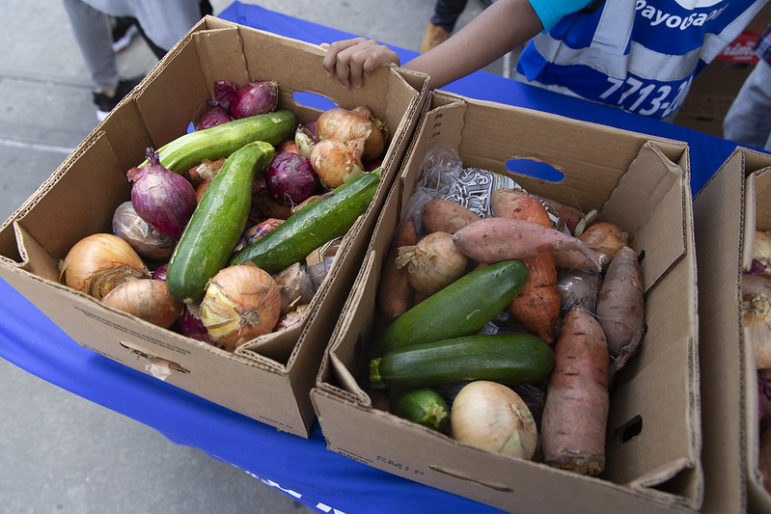“People experiencing food insecurity deserve more than the calorie-dense, ultra processed bare minimum. That means choice of food and access to options should not solely be a privilege of the wealthy.”

John McCarten/NYC Council
A box of groceries at a food distribution event.Regardless of how well intentioned, not all donations are created equal. With 33.8 million Americans experiencing food insecurity, the highest rate since December 2020, it’s normal to wonder how you can help. For many, that means donating canned and shelf-stable items. I’m sure many of us participated in corporate, school or religious-sponsored can drives. However, my work in the restaurant industry and the anti-hunger world has taught me that calories over quality is never the way to go.
To most, donating a can of cream of mushroom soup or packing white bread peanut butter and jelly sandwiches is seen as a job well done. But people experiencing food insecurity deserve more than the calorie-dense, ultra processed bare minimum. That means choice of food and access to options should not solely be a privilege of the wealthy. As friend and fellow anti-hunger activist Robert Egger always says, “21st Century charity seems to be about the redemption of the giver instead of what it should be about: the liberation of the receiver.” It’s time we phase out the “good is good enough” mentality that has too often been the way the food insecurity industry has operated.
At West Side Campaign Against Hunger (WSCAH), we serve over 70,000 customers per year. We distribute more than 4 million pounds of healthy food with 55 percent of all food being fresh produce. We also employ a food distribution model that emphasizes customer needs and wants, rather than distributing a pre-selected bag of non-perishable canned goods. This was our mission from the onset, making sure all New Yorkers have access to choices of healthy food and supportive services. But upholding dignity, community, and choice has not been without our fair share of battles along the way, particularly as the need has grown decade after decade.
Almost six years ago, I was early in my role at WSCAH and was informed about a massive food donation delivery that fell far below our standards: sodium-heavy boxed dinners, sugary beverages, fatty chips and other highly-processed junk. Ultimately, we refused to hand out this unhealthy food that would sacrifice long term health for short term calories, a decision I stand behind to this day.
We’re unflinching about our health standards for donations, and though our goal is to make these standards the industry norm, that rationale goes beyond just the principle. Feeding hungry people quality food can have far-reaching health impacts. Through our partnership with New York-Presbyterian, food insecure families that receive our distribution of fresh and healthy produce regularly exhibited a decline in childhood obesity outcomes and improved food security. We need to prioritize prevention over emergency intervention if we ever hope to solve hunger in the long term.
Unfortunately, we won’t lift people out of hunger via charity or even with healthy food alone. Affordable housing, accessible healthcare, and thriving wages are deeply intertwined in the anti-hunger effort. People need to be fairly compensated and have access to steady employment, so they can afford their most basic needs. This starts with expanding job opportunities across the city and lifting the minimum wage so that people can afford to buy fresh produce without compromising their paycheck. For those unemployed or underemployed, more food assistance dollars should be available, not less. SNAP benefits serve as a lifeline and we must expand access so that more families can purchase the food they need.
Food insecurity agencies need to collaborate in solving the hunger crisis. New York City has over 500 food pantries and over 100 soup kitchens. No single organization will fix the challenges we face in ensuring every family has access to quality choices alone. Historically, our work has lacked the partnerships necessary to truly tackle this systemic issue and serve the people most impacted.
This is why, together with seven other frontline organizations, we created the Roundtable: Allies for Food Access, a network of emergency food providers that through strategic purchasing has fed over 40 million meals to New Yorkers in need at a lower cost, while staying true to our commitment to customer choice. Anti-hunger organizations must care more about the missions they claim to strive toward rather than being the one organization to “solve” hunger for good. State and federal advocacy remains a core aspect of the Roundtable to shift anti-hunger policies to truly favor those most impacted.
The truth is that in our city, people truly care. No one wants to see hunger. But caring is not enough. We need to shift beyond a charity-centric approach to a customer-centric, efficient model of ending food insecurity. It is not about poundage and it’s certainly not about peanut butter and jelly sandwiches—this is about changing the actual ways of working to do the most good possible. We must harness the collective power of anti-hunger organizations and lean on the local knowledge and dedication for this work. Community problems need community solutions and hunger is no different.
Gregory Silverman is the CEO of West Side Campaign Against Hunger.








